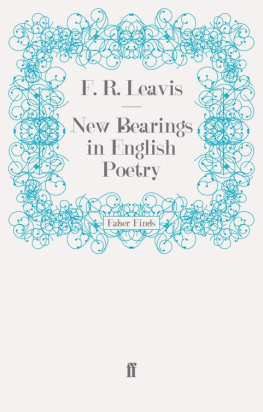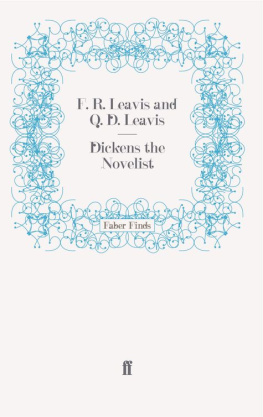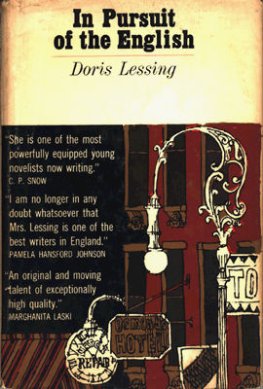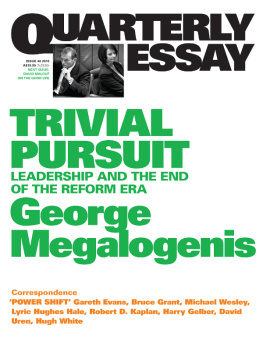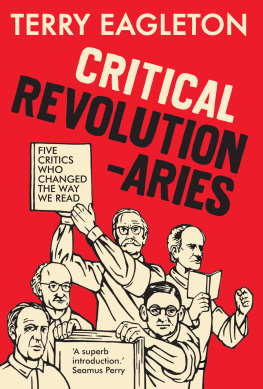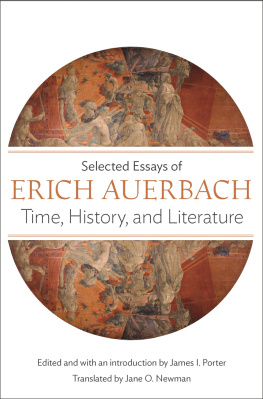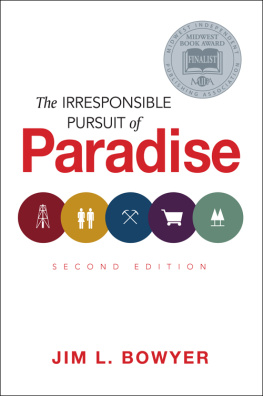COPYRIGHT 1952 BY F- R. UBAVIS
FIRST PUBLISHED IN ENGLAND! 1952 BY CHATTO & WINDXJS, LTD PRINTED IN GREAT BRITAIN
For MY WIFE
Contents
PREFACE page v
MR ELIOT AND MILTON 9
IN DEFENCE OF MILTON 33
GERARD MANLEY HOPKINS 44 THE LETTERS OF GERARD MANLBY HOPKINS 59
THE IRONY OF SWIFT 73
'THE DUNCIAD' 88
JOHNSON AND AUGUSTANISM 97
JOHNSON AS POET 116
TRAGEDY AND THE 'MEDIUM' 121 DIABOLIC INTELLECT AND THE NOBLE HERO 136
'MEASURE FOR MEASURE' 160 THE CRITICISM OF SHAKESPEARE'S LATE PLAYS 173
LITERATURE AND SOCIETY 182
SOCIOLOGY AND LITERATURE 195
BUNYAN THROUGH MODERN EYES 204
LITERARY CRITICISM AND PHILOSOPHY 211
HENRY JAMES AND THE FUNCTION OF 223 CRITICISM
THE WILD, UNTUTORED PHOENIX page 233
MR ELIOT, MR WYNDHAM LEWIS AND 240 LAWRENCE
THE LOGIC OF CHRISTIAN DISCRIMINATION 248
KEYNES, LAWRENCE AND CAMBRIDGE 255
E. M. FORSTER 261
APPROACHES TO T. S. ELIOT 278
THE PROGRESS OF POESY 293
INDEX 299
Preface
T TAKE the title of this book from The Function of Criticism, JL one of those essays of Mr Eliot's which I most admire. The immediately relevant passage runs:
'Here, one would suppose, was a place for quiet co-operative labour. The critic, one would suppose, if he is to justify his existence, should endeavour to discipline his personal prejudices and cranks tares to which we are all subjectand compose his differences with as many of his fellows as possible in die common pursuit of true judgment.'
'The common pursuit of true judgment': chat is how the critic should see his business, and what it should be for him. His perceptions and judgments are his, or they are nothing; but, whether or not he has consciously addressed himself to cooperative labour, they are inevitably collaborative. Collaboration may take the form of disagreement, and one is grateful to the critic whom one has found worth disagreeing with.
Most of the matter in this volume originated in a consciously collaborative enterprisea sustained effort to promote the 'co-operative labour* of criticism. It appeared in Scrutiny, a review that, when the literary history of the past two decades comes to be written, may perhaps be found to have done more to vindicate and maintain the critical function in the English-speaking world than the very small amount of publicly accorded recognition would suggest To the Editors of Scrutiny I am indebted for permission to reprint what first appeared there. 'Johnson and Augustanism' and 'Mr Eliot and Milton' appeared in The Kenyan Review and The Sewanee Review respectively, and I have to thank the Editors for permission to reprint those essays.
Five collaborators to whom I am especially grateful are Mr Quentin Anderson, Professor L. C. Knights, Mr George Santa-yana, Fr. A. A. Stephenson, S.J., and Professor Rene Wellek, critics to whom I am indebted for the peculiar advantage repre
A*
sented by a set critical exchange. The reader will recognize that, in so far as they are present in the essays of mine referring to them, they are present for my convenience, and that what they themselves have said is not fairly to be deduced from my referencesany more than it is to be concluded that, given the opportunity, they would have nothing to rejoin.
Criticism, the 'pursuit of true judgment*, is not, of course, a pursuit that one can count on finding very commonly practised or favoured. It was by way of countering the wrong meaning of 'common' that I picked my epigraphs from Henry James. The 'associational process' to which he refers (he is declining the offered chairmanship of the English Association) has become a much more formidable menace since his time; how formidable, I suggest in 'The Progress of Poesy', the last piece presented in the following collection. I have not included that piece and given it the salience of the final place out of wanton provocativeness. It seems to me that no one seriously interested can have failed to perceive that, where the critical function is concerned, what peculiarly characterizes our time in England is the almost complete triumph of the 'social' (or the 'associatioiial') values over those which are the business of the critic.
Everyone can think of striking illustrations of what I am referring to. So striking are some of the most recent, and so obviously disastrous must this state of affairs be for literature, and consequently for so much else, that this discouraging moment is perhaps especially one when the explicit challenge may seem not altogether pointless. However that may be, a critic who has thought his pursuit worth his toil must feel that he is committed to taking the opportunity that offers, and to turning such attention as he can winif he can win anyon the lamentable and unanswerable facts.
F. R. LEA vis
Acknowledgments
I am indebted to Messrs Edward Arnold & Co. for kind permission to quote the extract from Professor Raleigh's On Writing and Writers in my essay on * Sociology and Literature*; to the Oxford University Press for permission to quote the extract on page 190 from Cecil Sharp's Introduction to English Folk-Songs from the Southern Appalachians, and to The Society of Jesus and the Oxford University Press for permission to quote from Hopkins's letters and
poems.
F.R.L,
For me, frankly, my dear John, there is simply no question of these things: I am a mere stony, ugly monster of Dissociation and Detachment. I have never in all my life gone in for these things, but have dodged and shirked and successfully evaded themto the best of my power at least, and so far as they have in fact assaulted me: all my instincts and the very essence of any poor thing that I might, or even still may, trump up for the occasion as my 'genius' have been against them, and are more
against them at this day than ever I can't go into it all much
but the rough sense of it is that I believe only in absolutely independent, individual and lonely virtue, and in the serenely unsociable (or if need be at a pinch sulky and sullen) practice of the same; the observation of a lifetime having convinced me that no fruit ripens but under that temporarily graceless rigour, and that the associational process for bringing it on is but a bright and hollow artifice, all vain and delusive.
HENRY JAMES, Letter to John Bailley, ii Nov. 1912
They are, in general, a sort of plea for Criticism, for Discrimination, for Appreciation on other than infantile linesas against the so almost universal Anglo-Saxon absence of these things; which tends so, in our general trade, it seems to me, to break the heart*
HENRY JAMES, Letter to W. D. Howells, 17 AUGUST 1908
The Norwegian Society of Authors gave him a loving cup, but he asked them to scratch off the inscription and give it to somebody else.
Obituary notice O/KNUT HAMSUN
At the end of my first term's work I attended the usual college board to give an account of myself. The spokesman coughed and said a little stiffly: 'I understand, Mr Graves, that the essays that you write for your English tutor arc, shall I say, a trifle temperamental. It appears, indeed, that you prefer some authors to others.'
ROBERT GRAVES, Goodbye to All That
MR ELIOT AND MILTON
MR ELIOT'S paper on Milton, delivered in England as a British Academy * Lecture on a Master Mind', and later broadcast in the Third Programme, was widely acclaimed as a classic of recantationan authoritative and final piece of criticism, vindicating Milton against 'errors and prejudices' propounded by the same critic in his less discerning days, and slavishly taken up by his followers. On me, however, the paper has the effect of showing that Mr Eliot found himself unable to bring to Milton any but a perfunctory interest. And, as a matter of fact, I know of no evidence that his interest in Milton was at any time intense. In saying this I intend no score against Mr Eliot. In what I judge to have been his best days as a critic, the interest was adequate to his purposes, which were very effectually achieved, and it might perhaps be said that the recent paper shows him interested enough for the purposes of an address on Milton to the British Academy.


